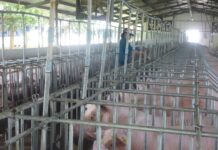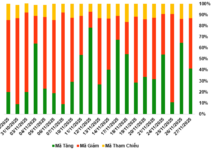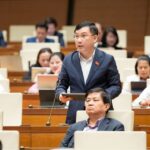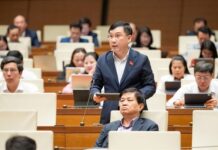On the morning of November 27th, the National Assembly engaged in a plenary discussion on the draft amended Investment Law. Delegates focused on investment approval procedures, special investment procedures, and conditional business sectors.
Transitioning to Risk-Based Governance
Delegate Lê Hoàng Anh (Gia Lai) highlighted the investment approval process as a critical factor influencing capital flow speed and costs.
He emphasized that revisions to approval regulations should be based on three pillars: “selective retention – principled elimination – risk-based design.” He criticized the current system for applying uniform procedures to projects with varying risk levels, leading to unnecessary delays for low-risk projects and inadequate oversight for high-risk ones.
“A nuclear power plant, with its extreme risks, undergoes the same approval process as a 5-hectare housing project, which poses lower risks and can be rectified if planning errors occur. Many countries, like Singapore and South Korea, have adopted risk-based governance. This draft law should follow suit,” he recommended.
He proposed retaining only eight high-risk cases related to national defense, security, severe environmental impact, and cultural heritage, to safeguard core national interests. He also suggested streamlining the 21-item list to 18 by removing redundancies with specialized laws, avoiding “overlapping pre-checks.”
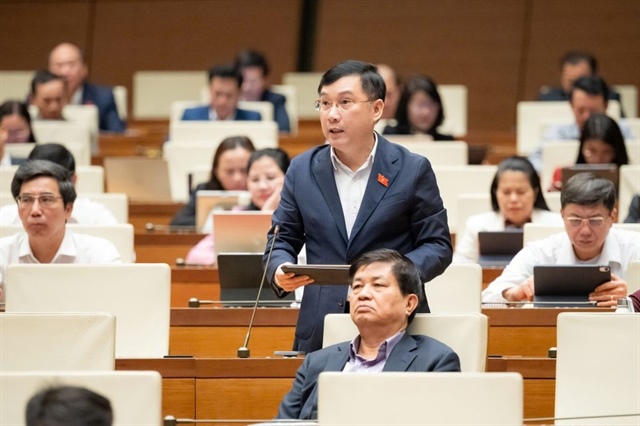
Delegate Lê Hoàng Anh speaks on Investment Law amendments. Photo: QH |
“Specifically, projects like airlines (already tightly regulated by the Aviation Law and ICAO standards) or Type I seaports (controlled by the Maritime Law) should be removed from Article 25, adhering to the principle of ‘one task – one time – one agency’,” Delegate Hoàng Anh stated.
He also advocated for flexible mechanisms for strategic projects in semiconductors, data centers, digital infrastructure, and renewable energy.
Delegate Hà Sỹ Đồng (Quảng Trị) expressed concern that Article 25 in the draft law expands the scope of projects requiring approval to include commercial housing and urban areas regardless of size, leading to prolonged waiting times. He suggested, “Approval should only be required for projects using land over 50 hectares or with a population exceeding 3,000; expansion projects under 20% should not need re-approval.”
“The essence is to institutionalize investment freedom, reducing approval-seeking,” Delegate Hà Sỹ Đồng said.
Significant Reduction in Conditional Business Sectors
Delegates, guided by Resolutions 66 and 68 of the Politburo, discussed conditional business sectors.
Delegate Lê Hoàng Anh fully supported the government’s bold cuts but noted, after reviewing Appendix IV, that further reductions were possible. Some sectors, if subject to conditions, only require product technical standards, not legal-level regulations.
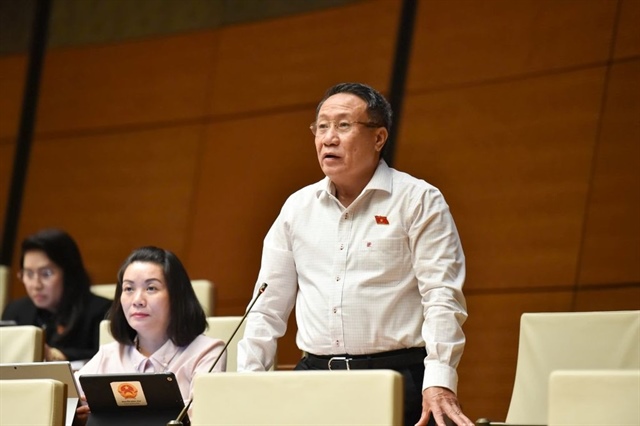
Delegate Hà Sỹ Đồng emphasizes investment freedom in law revisions. Photo: QH |
“The food business category is overly broad; food safety standards are already covered by specialized laws. Similarly, e-commerce should not encompass logistics and small-scale payments; only large-scale platforms with consumer data should be regulated,” Delegate Lê Hoàng Anh said, identifying several sectors for removal.
He argued that the conditional business list should only include high-risk sectors requiring legal control, with technical standards placed in subordinate legislation for quick updates. He proposed a 3-year periodic review mechanism, automatically expiring non-compliant sectors as per OECD and ASEAN practices.
He also suggested removing “other requirements” from Article 7, Clause 6 to prevent “hidden sub-licenses.”
Finance Minister Nguyễn Văn Thắng explained that the Ministry, tasked by the Prime Minister, rigorously reviewed and maximally reduced conditional business sectors.
“Initially, we reported to the National Assembly Standing Committee a reduction of around 25 sectors, but further review suggests a minimum cut of 50 sectors,” the Minister stated.
He assured that post-enactment, the government would task ministries with further revisions, shifting to standard-based controls to ensure full business freedom for citizens and enterprises.
Regulating E-cigarettes and Laughing Gas
Minister Nguyễn Văn Thắng addressed investment approval procedures, noting revisions based on committee discussions. The draft law now handles projects requiring special mechanisms or urgent, unexpected cases.
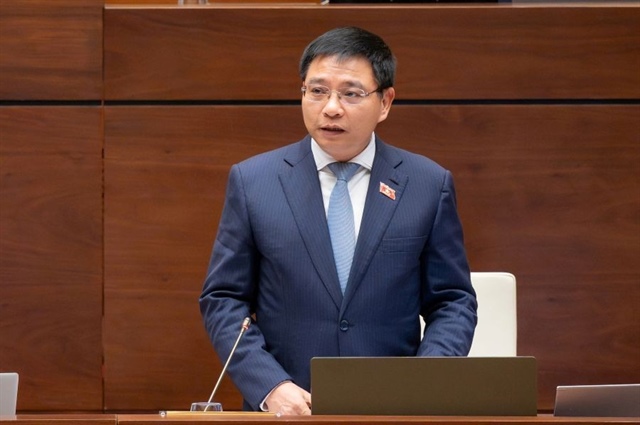
Finance Minister Nguyễn Văn Thắng addresses delegates’ concerns. Photo: QH |
Regarding approval authority delegation, Law 90 (amending multiple investment-finance laws) already delegates authority from the Prime Minister to provincial People’s Committees for eight project groups, including those involving resettlement of over 10,000 people in mountainous areas or 20,000 elsewhere, or non-seaport projects.
“This draft law updates the Investment Law and Law 90, not introducing new regulations, and is currently implemented smoothly,” the Minister said, noting similar amendments in the Planning Law.
Delegates Phạm Trọng Nhân (Ho Chi Minh City) and Nguyễn Anh Trí (Hanoi) raised concerns about banning laughing gas and e-cigarettes per National Assembly Resolution.
Minister Nguyễn Văn Thắng confirmed the draft law bans e-cigarette and heated tobacco trade, with no exceptions due to lack of legal, political, and practical grounds.
The law addresses transitional cases of export-only e-cigarette and heated tobacco equipment production projects approved before Resolution 173’s effectiveness.
“We accept Delegates Nguyễn Anh Trí and Phạm Trọng Nhân’s input, adding narcotics and psychotropic substances. We’ll collaborate with the Ministry of Public Security and Ministry of Health for precise adjustments, including exceptions for Ministry of Health-approved production,” the Minister concluded.
REPORTING TEAM
– 12:28 27/11/2025
Exciting News: Rice Exports, Accounting Services, and 23 Other Industries Proposed by the Government to Operate Without Business Licenses
The government has submitted a draft amendment to the Investment Law to the National Assembly, proposing the elimination of conditional business requirements for 25 sectors, including accounting services and rice exports. This move aims to significantly shift from ex-ante to ex-post inspection, fostering greater business freedom and streamlining regulatory processes.


